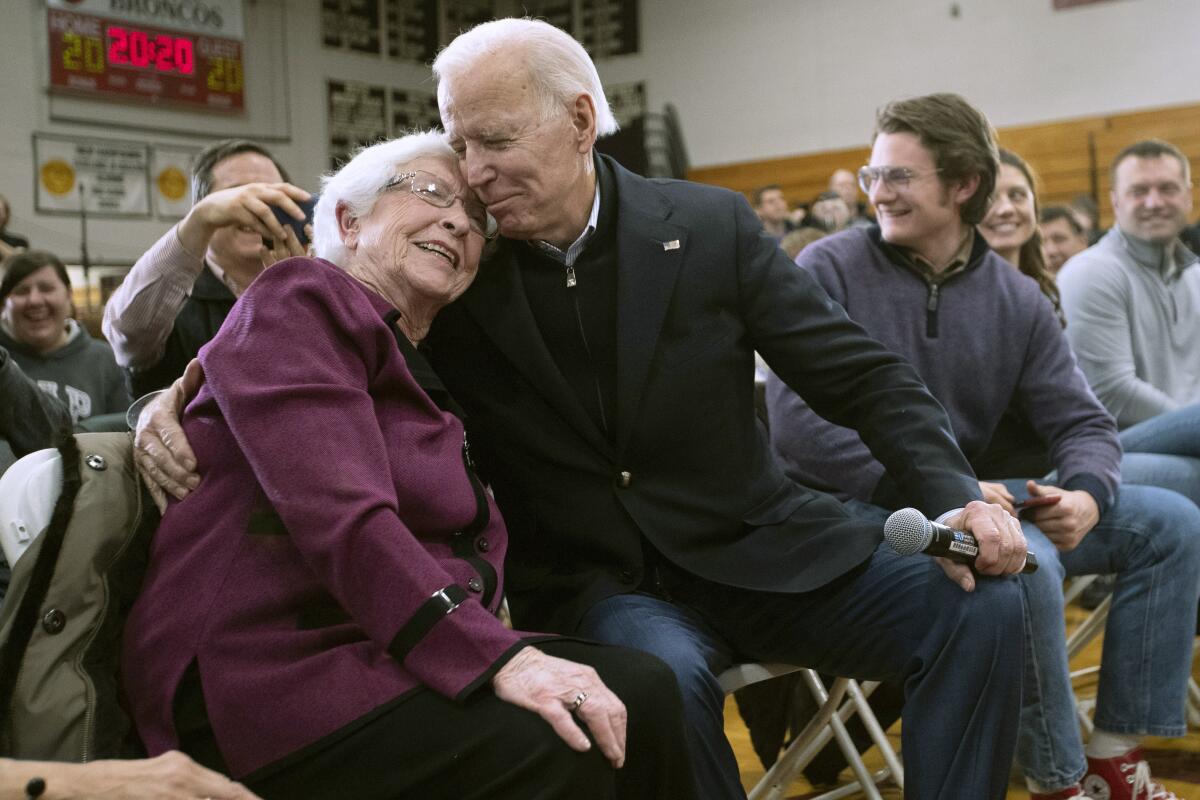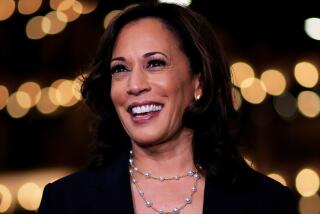Biden says he’s not trying to win the nation’s (unofficial) first primary. The truth is more complicated

WASHINGTON — President Biden has forgone campaigning in New Hampshire, but top Democrats’ actions in recent weeks — and Biden’s planned visit to neighboring Boston on Tuesday — suggest he is still eager to avoid embarrassment in what’s traditionally been the country’s first presidential primary.
Biden will not appear on the ballot in New Hampshire, which broke Democratic National Committee rules by jumping ahead of South Carolina in the party’s new primary calendar. Rule changes Biden’s allies pushed through the DNC will ensure the winner of the unsanctioned primary, which is set for Jan. 23, moves no closer to the Democratic nod.
For the record:
7:15 a.m. Dec. 5, 2023An earlier version of this story said that New Hampshire was traditionally the first presidential nominating contest. It was the first presidential primary.
But Biden allies, including Rep. Ro Khanna of Fremont, are pushing a write-in campaign for the president in New Hampshire anyway. Top Democrats, including House Minority Leader Hakeem Jeffries of New York, have been making Biden’s case to New Hampshire Democrats in person.
And on Tuesday, the president came within 40 miles of the state he’s supposedly ignoring when traveled to nearby Boston for a fundraising blitz that made headlines across the Granite State.
Biden and his allies’ actions reflect the reality that although New Hampshire’s primary is unrecognized by the DNC, it will still serve as a first test for an incumbent president facing strong electoral headwinds, including sagging poll numbers among young people and voters of color.
In a trio of campaign fundraisers, Biden laid out the case for his reelection, repeatedly emphasizing that former President Trump, the leading GOP contender, was a direct threat to democracy.
“Donald Trump and his MAGA Republicans are determined to destroy American democracy,” he told a group of donors. “If Trump wasn’t running, I’m not sure I’d be running. But we cannot let him win, for the sake of the country.”
He briefly mentioned New Hampshire as he talked about the threat to reproductive rights, which has been a galvanizing issue for Democrats since last year’s Supreme Court decision overturning Roe vs. Wade.
Referring to “radical bans all across America,” Biden pointed to four New Hampshire Republicans who proposed a bill earlier this week that would ban abortion at 15 days’ gestational age.
To avoid the sting of humiliation, Democratic elected officials, party leaders and activists have spent the past several weeks encouraging voters to write in Biden’s name on the New Hampshire ballot, firmly ensconcing the incumbent president in a contest that’s no longer supposed to matter.
In late November, Biden allies went further, launching Granite for America, a super PAC dedicated to the write-in effort that can raise and spend unlimited amounts of money, according to Federal Election Commission filings.
On Thursday, Khanna held a conference call to rally New Hampshire organizers, state lawmakers, community leaders and labor leaders to aid the president’s reelection campaign — despite his absence from the ballot.
“Even though some [New Hampshire Democrats] were not happy with the process, they understand the stakes,” he said. “They care about a good turnout and I care that we get the message out for the president and he has a good showing because I think it will set the momentum for the rest of the campaign.”
Khanna, who debated GOP presidential hopeful Vivek Ramaswamy at St. Anslem College’s New Hampshire Institute of Politics in early November, has twice visited the politically important state over the last year. He said state party officials have invited him to return to turn out Biden voters.
At the New Hampshire Democrats’ annual Eleanor Roosevelt dinner on Friday, during which Jeffries made the case for Biden, the pro-write-in group passed out “write in Joe Biden” stickers and lawn signs to guests.
U.S. Rep. Dean Phillips (D-Minn.), Biden’s most high-profile Democratic challenger, is among the 21 names listed on the New Hampshire ballot, along with self-help author Marianne Williamson. Phillips and Williamson have spent a considerable amount of time campaigning for what could only amount to a symbolic victory.
Phillips’ campaign manager is former Andrew Yang campaign chief Zach Graumann, who was credited with attracting media attention to Yang’s quixotic 2020 primary campaign. Phillips has also received outside help from veteran GOP strategist Steve Schmidt, who is expected to launch a Super PAC supporting him. Williamson’s campaign manager, Carlos Cardona, is the former chair of the Laconia, N.H., Democrats, and has ties to Sen. Bernie Sanders (I-Vt.), Biden’s main opponent four years ago.
The unofficial primary offers a great chance for New Hampshire Democrats to test campaign messaging, increase turnout, recruit poll workers — and prove that the DNC was wrong to push the state out of the first spot on the calendar, local party leaders and strategists argue.
Some New Hampshirites still feel the DNC is punishing them for Sanders’ wins there in 2016 and 2020, and that party leaders “don’t like the free-thinking voters of New Hampshire, which is exactly what makes New Hampshire special,” New Hampshire Democratic Party chair Ray Buckley argued.
The write in offers a “really great opportunity for Democrats,” said Lucas Meyer, a long-time Democratic political strategist in the state. “To use the write-in as an opportunity to get party activists and local committees trained up on how to talk about the campaign — I think that’s the best way to stick it to the DNC.”
Strategists and experts have compared Biden to former President Lyndon B. Johnson, the Democratic incumbent who overlooked New Hampshire in 1968, only to narrowly defeat a challenge from U.S. Sen. Eugene McCarthy of Minnesota (Johnson won 49% of the vote compared with McCarthy, who won 42%). Johnson dropped out of the race a few weeks later.
But Biden is helped by the lack of serious Democratic competition, according to Dante Scala, political science professor at the University of New Hampshire.
“For Biden, in some ways I think he would rather see the whole primary go by as quietly as possible,” Scala said. “There are really large concerns about Biden’s age and so forth among Democrats, no question about it. If there was a serious alternative, it would be a different sort of race.”
Former state Democratic Party chair Kathy Sullivan, who helped organize the write-in effort and launch the super PAC, said she was “mad if not madder than other people” about Biden’s snub, but said the grassroots effort was more about preventing Trump from returning to the White House.
“You have to put aside your anger and frustration at the process and say, ‘What’s the best way of keeping Trump out of the White House, or some other MAGA-type person? That’s to reelect Joe Biden.’ He’s our guy and he’s done a good job,” Sullivan told The Times.
“One thing you hear a lot from the write-in Biden people is ‘Don’t cut your nose off to spite your face,’” she said. “This is about the future of our democracy, the future of our country, so suck it up and do what the best thing is for the county, the best thing is for democracy and frankly the best thing is for the New Hampshire primary.”
Still, sitting presidents who faced strong insurgent rivals from their own parties have failed to retake the White House since 1968, Sullivan said.
Johnson’s drop-out ultimately led to Richard Nixon’s victory. Gerald Ford fended off a challenge from Ronald Reagan in 1976, Jimmy Carter from Ted Kennedy in 1980, George H.W. Bush from Pat Buchanan in 1992 — three elections in which the incumbents ultimately lost.
For Biden, there can be no margin of error in what’s expected to be a 2020 rematch.
“That’s a danger here,” Sullivan said. “That’s why the write-in is important.”
More to Read
Get the L.A. Times Politics newsletter
Deeply reported insights into legislation, politics and policy from Sacramento, Washington and beyond. In your inbox three times per week.
You may occasionally receive promotional content from the Los Angeles Times.












